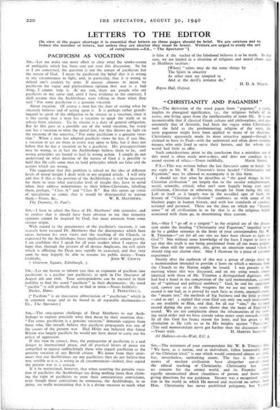SIR,—May I " go off at a tangent " to
the original arc of the discus- sion- under the heading " Christianity and Paganism," impelled so to do by a golden sentence in the letter of your correspondent Mr. W. R. Titterton—" yet for all our sins we have been chosen to fight for God"? Not without some knowledge of the facts I regret to have o say that this truth is not being proclaimed from all too many pulpits. Too often still the trumpet, alas, gives an uncertain sound where it should ring out clarion clear. May I illustrate by a piece of personal experience?
Shortly after the outbreak of this war a group of clergy drew up a memorandum intended to provide a basis on which a message from the Church to the Nation might be issued. I was present at the meeting where this was discussed, and on my using words almost identical with those of Mr. Titterton a distinguished dignitary, who had had a hand in the composition of the said memorandum, accused me of " spiritual and political snobbery." God, he and his :supporters said, cannot use us as His weapons for we are not worthy. Our record is too bad, as is proved by such facts as slums, unemployment, the " means test," the methods of big business and the little profiteer —and so on! 1 replied that even God can only use such instruments as are available to Him, and that, for all our " sins," the national record during the past 5o years shows that the heart of England is sound. We are not complacent about the inhumanities of the exist- ing social order and we have already taken many steps towards reform. In all this God has found reason for hope, and has given us His absolution as He calls us to be His knights against "Paganism.* (The said memorandum never got further than the discussion :-:age!)


























 Previous page
Previous page